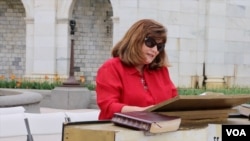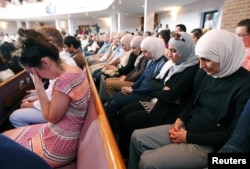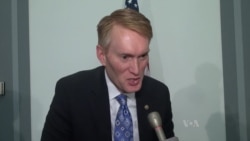In a chilly spring drizzle, people lined up Thursday morning to read the Bible nonstop in front of the U.S. Capitol in Washington, D.C.
The annual 90-hour U.S. Capitol Bible Reading Marathon, now in its 27th year, marks the National Day of Prayer.
"It’s foundational for who we are as human beings to know our purpose, and our purpose comes from our creator," Pastor Jeffrey Light of NOVUM Baptist Church in Virginia told VOA, saying that the event aims to highlight the importance of religion in American life.
Few know its role better than Alan Cooperman, director of religion research at the Washington-based Pew Research Center.
According to two major surveys conducted by the center in 2007 and 2014, the American public, while still very religious, has become less so.
"The percentage of Americans who say they believe in God has dropped a little," Cooperman told VOA, explaining that the percentage of Americans who say they pray daily has dropped, along with the percentage who say they go to church at least once a month.
"Maybe most strikingly, the share of Americans who don't identify with any religion, has been rising very rapidly," he added. "It's gone from 7 percent in 2000 [and] 16 percent in 2007 to 23 percent overall today."
Cooperman believes the drop in religious engagement reflects a generational change. Young Americans are coming of age less religiously affiliated — and less connected to religious institutions — than older Americans are. Younger Americans are also much less religiously engaged than previous generations were when young.
Religion and politics
But members of Congress and government officials are more likely to be religious than the general public. In other words, organized faith continues to play an important role in U.S. politics.
Of current legislators, more than 90 percent are Christian, compared to 73 percent among the general public. At a recent Senate discussion, members of Congress talked about how they balance faith and politics.
It's "the lens I look through, as everyone has their own lens they look through," Senator James Lankford, a Republican from Oklahoma, told VOA. "So it should permeate every part of who I am. If it's a faith, it affects everything."
Of the varied religious backgrounds represented in the 114th Congress — including Christian, Muslim, Hindu and Jewish — there are also some atheists. But the prospect of electing an atheist president seems to remain unthinkable.
"A friend said to me, ‘Which of these types of president would be the last to be elected? African-American, woman, gay, or an atheist president?’" said Senator Chris Coons, a Democrat from Delaware. "And he said, 'It's the atheist president.'"
‘Overwhelmingly religious’
For Cooperman, even the increasing number of Americans who do not identify with any religious group may not be enough to drastically alter the role of faith in American life and politics.
"While the share of the American public that doesn't identify with any religious group has been rising quite rapidly, the American public remains overwhelmingly religious," he said. "It's a very religious country. Three quarters of Americans, about 77 percent of the population, still identify with a religious group."
Regardless of statistics, Pastor Light says the role of religion will nonetheless continue to play a key part in this year's presidential election.
"Of course each citizen in this country will pursue the leader that they are moved to pursue, but as for me and those that are seekers of the word of God, we will certainly seek a leader who honors God," he said.
This report was produced in collaboration with VOA's Mandarin Service.







